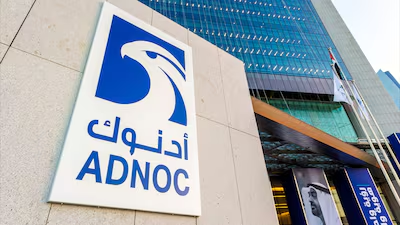The Abu Dhabi National Oil Company (ADNOC) is reportedly in discussions to acquire energy assets from Mubadala Investment Company, the sovereign wealth fund of the United Arab Emirates (UAE). This potential acquisition underscores ADNOC’s strategic efforts to expand its energy portfolio and strengthen its position in the global energy market.
ADNOC’s Expansion Strategy
ADNOC has been actively pursuing growth opportunities to diversify its operations and enhance its global footprint. In recent years, the company has engaged in several strategic partnerships and acquisitions to bolster its presence in various energy sectors.

As part of its long-term vision, ADNOC has focused on broadening its investments beyond traditional oil and gas operations. The company is increasingly prioritizing natural gas, petrochemicals, and renewable energy. Its expansion strategy aligns with global energy trends, which emphasize sustainability and clean energy solutions while maintaining core hydrocarbon operations.
One of ADNOC’s significant milestones in its expansion strategy was its participation in a landmark transaction involving Masdar, Abu Dhabi’s flagship clean energy company. In collaboration with Mubadala Investment Company and Abu Dhabi National Energy Company (TAQA), ADNOC played a pivotal role in reshaping Masdar into a global leader in renewable energy and green hydrogen.
This move was part of the UAE’s broader plan to transition toward cleaner energy while leveraging its existing strengths in hydrocarbons. ADNOC holds a 24% stake in Masdar’s renewable business and a 43% stake in its green hydrogen business. The company aims to support Masdar’s ambition of achieving at least 100 gigawatts (GW) of renewable energy capacity worldwide by 2030.
Mubadala’s Energy Portfolio
Mubadala Investment Company, established in 2002, manages a diverse portfolio of assets across various industries, including energy, utilities, technology, and healthcare. With a focus on long-term investments, the sovereign wealth fund has played a crucial role in the economic diversification of the UAE.
In the energy sector, Mubadala has a wide range of investments, including oil and gas, petrochemicals, and renewable energy projects. The company has been involved in major energy ventures both in the UAE and internationally. Among its key assets is its stake in Nova Chemicals, a leading North American polyethylene producer. This investment is part of Mubadala’s broader strategy to maintain a strong presence in the global energy and petrochemical markets.
As the global energy transition accelerates, Mubadala has gradually increased its focus on sustainable investments, aligning with international climate goals and the UAE’s commitment to reducing carbon emissions. The potential sale of some of its energy assets to ADNOC could be part of its strategy to realign its portfolio towards new industries and emerging technologies.
Potential Synergies and Strategic Benefits
If ADNOC proceeds with acquiring Mubadala’s energy assets, it could gain several strategic advantages:
- Enhanced Global Presence: Mubadala’s energy investments, particularly in petrochemicals and international ventures, could significantly boost ADNOC’s presence in key global markets. The acquisition would provide ADNOC with additional assets that complement its existing operations and expand its influence beyond the Middle East.
- Diversification: By integrating Mubadala’s energy assets, ADNOC would diversify its portfolio across multiple energy sectors, reducing dependence on traditional hydrocarbons. This move aligns with the UAE’s strategy of economic diversification and energy sustainability.
- Operational Efficiency: The merger of resources, expertise, and technology could lead to increased operational efficiency and cost savings. ADNOC has been investing in digital transformation and automation to optimize energy production, and integrating Mubadala’s assets could further enhance these efforts.
- Strengthening the UAE’s Position in Global Energy Markets: The UAE has long been a key player in global energy markets, and ADNOC’s acquisition of Mubadala’s energy assets would reinforce its leadership position. This move would also align with the country’s goal of becoming a hub for innovation in the energy sector.
Industry Context
The global energy sector is undergoing a significant transformation, driven by the increasing emphasis on sustainability and renewable energy. Governments and corporations worldwide are investing in cleaner energy solutions to reduce carbon emissions and meet climate targets.
Companies like ADNOC are adapting to these changes by balancing their investments between traditional oil and gas operations and new energy technologies. ADNOC’s recent moves highlight this strategic shift. In addition to its involvement with Masdar, the company has been expanding its natural gas and petrochemical operations to create a more resilient and diversified energy portfolio.
Additionally, ADNOC and Austria’s OMV recently announced a merger of their petrochemical assets to form Borouge Group International, a $60 billion entity specializing in polyolefins. This merger positions Borouge as the fourth-largest polyolefins company globally and reflects a strategic pivot towards chemicals and plastics, anticipating shifts in demand due to the rise of electric vehicles and the need for sustainable materials.
Future Outlook
If ADNOC successfully acquires Mubadala’s energy assets, it would mark a significant milestone in its expansion strategy. The move would reinforce ADNOC’s commitment to staying competitive in an evolving energy landscape while contributing to the UAE’s broader economic goals.
The UAE has been at the forefront of innovation in the energy sector, with an increasing focus on clean technologies, hydrogen, and renewable energy. The country has pledged to achieve net-zero emissions by 2050, and its energy giants, including ADNOC, are actively working toward this goal through strategic investments and partnerships.
The potential deal with Mubadala is expected to create new growth opportunities for ADNOC while allowing Mubadala to reallocate resources to other high-growth sectors. This could pave the way for further collaborations between the two entities in the future, strengthening the UAE’s position as a global leader in energy and innovation.
Conclusion
ADNOC’s consideration of acquiring energy assets from Mubadala Investment Company highlights its proactive approach to growth and diversification. This potential move aligns with global trends toward sustainability and reflects ADNOC’s commitment to maintaining its leadership position in the energy sector.
The ongoing discussions between ADNOC and Mubadala indicate the UAE’s strategic vision for its energy future. By leveraging their respective strengths, both entities could unlock new opportunities and drive further advancements in the global energy industry.
While the details of the acquisition remain undisclosed, this potential deal represents a major step in ADNOC’s long-term growth strategy. The outcome of these negotiations will be closely watched by industry experts, investors, and policymakers as ADNOC continues to shape the future of energy in the UAE and beyond.



